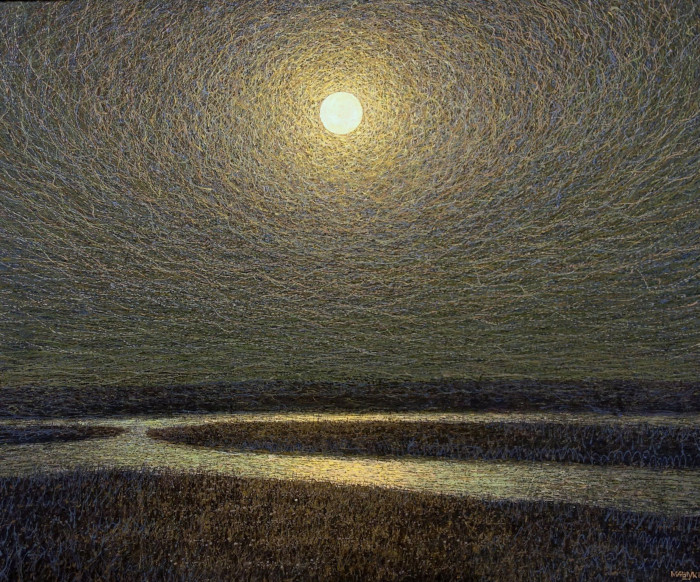Day 27 : Friday 24 March
Hear our voice, O Lord, according to your faithful love.
| Wisdom 2.1,12-22 | Psalm 34.15-22 | John 7.25-30 |

Ivan Marchuk, "Boundlessness", 1984.
Pavel Chesnokov (1877–1944). Setting of Tebe Poem a hymn concluding the consecration in the Liturgy of Saint John Chrysostom. The Chamber Choir of Europe, cond. by Nicol Matt at the European Church Music Festival, Münster of Schwäbisch Gmünd, 18 July 2019.
Тебе поем,
Тебе благословим,
Тебе благодарим, Господи,
и молим Ти ся, Боже наш.
We sing to you,
we praise you,
we thank you, O Lord,
and we pray to you, our God.
C. S. Lewis. Surprised by Joy: The Shape of My Early Life. Geoffrey Bles, 1955. Chapter 14, “Checkmate”.
(Continued from Day 26, yesterday.)
Of course I could do nothing—I could not last out one hour—without continual conscious recourse to what I called Spirit. But the fine, philosophical distinction between this and what ordinary people call “prayer to God” breaks down as soon as you start doing it in earnest. Idealism can be talked, and even felt; it cannot be lived It became patently absurd to go on thinking of “Spirit” as either ignorant of, or passive to, my approaches. Even if my own philosophy were true, how could the initiative lie on my side? My own analogy, as I now first perceived, suggested the opposite: if Shakespeare and Hamlet could ever meet, it must be Shakespeare’s doing.’ Hamlet could initiate nothing. Perhaps, even now, my Absolute Spirit still differed in some way from the God of religion. The real issue was not, or not yet, there. The real terror was that if you seriously believed in even such a “God” or “Spirit” as I admitted, a wholly new situation developed. As the dry bones shook and came together in that dreadful valley of Ezekiel’s, so now a philosophical theorem, cerebrally entertained, began to stir and heave and throw off its gravecloths, and stood upright and became a living presence. I was to be allowed to play at philosophy no longer. It might, as I say, still be true that my “Spirit” differed in some way from “the God of popular religion.” My Adversary waived the point. It sank into utter unimportance. He would not argue about it. He only said, “I am the Lord “; “I am that I am“; “I am.”
People who are naturally religious find difficulty in understanding the horror of such a revelation. Amiable agnos-tics will talk cheerfully about “man’s search for God.” To me, as ‘I then was, they might as well have talked about the mouse’s search for the cat. The best image of my predicament is the meeting of Mime and Wotan in the first act of Seigfried; hier brauch’ ich nicht Spärer noch Späher, Einsam will ich . . . (I’ve no use for spies and snoopers. I would be private. . . .) Remember, I had always wanted, above all things, not to be “interfered with.” I had wanted (mad wish) “to call my soul my own.” I had been far more anxious to avoid suffering than to achieve delight. I had always aimed at limited liabilities. The supernatural itself had been to me, first, an illicit dram, and then, as by a drunkard’s reaction, nauseous. Even my recent attempt to live my philosophy had secretly (I now knew) been hedged round by all sorts of reservations. I had pretty well known that my ideal of virtue would never be allowed to lead me into anything intolerably painful; I would be “reasonable.” But now what had been an ideal became a command; and what might not be expected of one? Doubtless, by definition, God was Reason itself. But would He also be “reasonable” in that other, more comfortable, sense? Not the slightest assurance on that score was offered me. Total surrender, the absolute leap in the dark, were demanded. The reality with which no treaty can be made was upon me. The demand was not even “All or nothing.” I think that stage had been passed, on the bus-top when I unbuckled my armour and the snow-man started to melt. Now, the demand was simply “All.”
You must picture me alone in that room at Magdalen, night after night, feeling, whenever my mind lifted even for a second from my work, the steady, unrelenting approach of Him whom I so earnestly desired not to meet. That which I greatly feared had at last come upon me. In the Trinity Term of 1929 I gave in, and admitted that God was God, and knelt and prayed: perhaps, that night, the most dejected and reluctant convert in all England. I did not then see what is now the most shining and obvious thing; the Divine humility which will accept a convert even on such terms. The Prodigal Son at least walked home on his own feet. But who can duly adore that Love which will open, the high gates-to a prodigal who is brought in kicking, struggling, resentful, and darting his eyes in every direction for a chance of escape? The words compellé intrare, compel them to come in, have been so abused by wicked men that we shudder at them; but, properly understood, they plumb the depth of the Divine mercy. The hardness of God is kinder than the softness of men, and His compulsion is our liberation.
May God our Redeemer show us compassion and love. Amen.